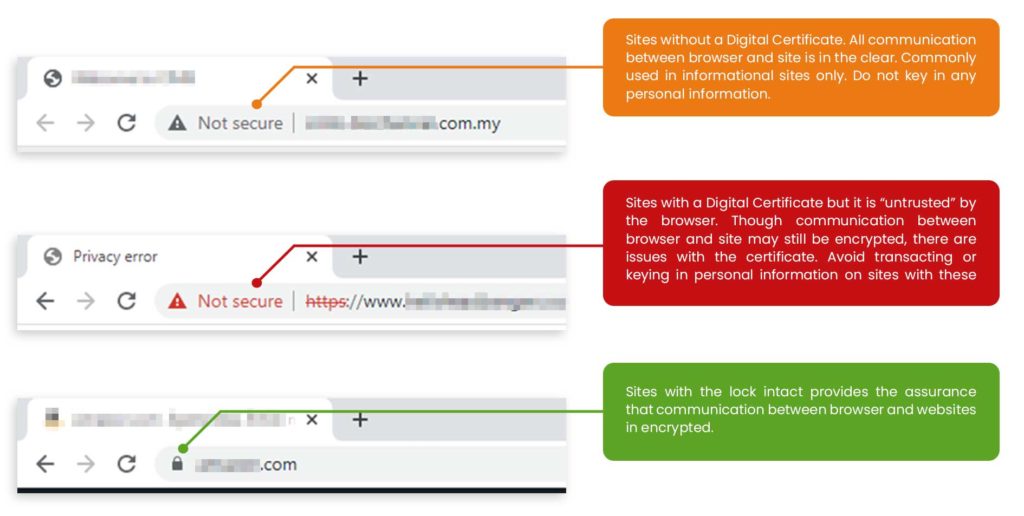I think by now, most users of the Internet would know to look for the lock symbol on a browser to know if the website is secure. But recently, we have also seen many cases where reported phishing sites with the lock symbols in place, tricking users into thinking the sites are authentic. However, it is important to understand a few facts about secure sites. Firstly, having the lock in place does not mean the site is immediately trustable, at least not yet. We need to know how to differentiate the types of certificates used to make a better call on trusting a website or not. For this purpose, we have added a downloadable poster for you to circulate to your users to educate them on what type of certificates are out there and what to look for in browsers to make sure it’s not a phishing site.
Understanding Digital Certificates
Showing both secure and insecure sites
Digital certificates are electronic files that use cryptographic algorithms to bind the identity of an individual, organization, or device to a corresponding public key. A digital certificate contains information such as the holder’s name, a copy of the holder’s public key, the certificate’s expiration date, the serial number, and the issuer’s digital signature.
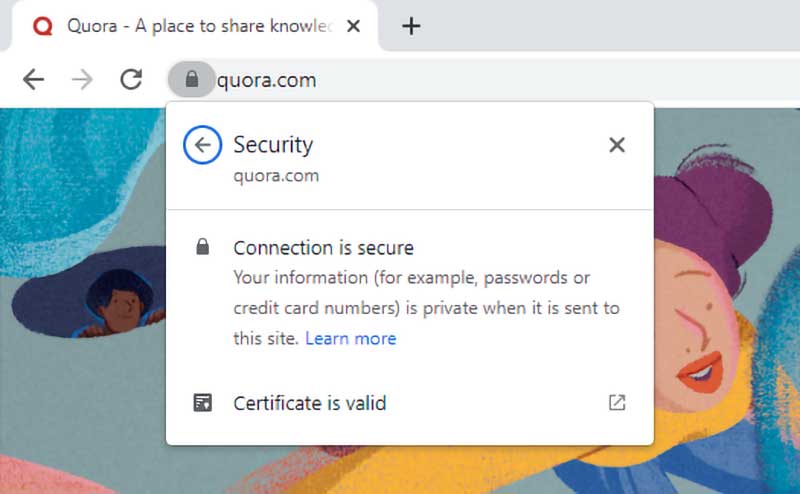
Secure website
There exist three types of digital certificates: domain-validated (DV), extended-validation (EV), and organization-validated (OV) certificates, which we will cover in this article.
1. Domain Validation Certs (DV)
Domain validated SSL certificates (DV SSL) are typically used by e-commerce sites to encrypt payments and personal information. They provide 256-bit encryption and are compatible with almost all the web and mobile browsers, including Chrome, Safari, Firefox, Edge, Opera Mini/Mobile, etc. Domain validated (DV) SSL certificates can only validate domains; they are not suitable for encrypting data. Both non-www and www domain versions may be secured by a single Domain SSL certificate (DV SSL).
How DV SSL Certificates Work
The domain validated (DV) certificate’s validation procedure is relatively straightforward. First, the user must show the certificate authority(CA) that they own the domain. SSL certificate authorities may request email confirmation, file verification, or check for the website’s registrar data to confirm the website domain.
- Email Verification – When you verify your information with the CA, it will send you an email with a verification link. The CA will provide a confirmation link in the email. Ensure the email address given has admin, postmaster, administrator, webmaster, and hostmaster.
- File-based Verification – During the verification process, CA will generate an HTML file (also known as an Authentication file or Auth file) with Hash data. Upload this file to the top level of the website server. The SSL certificate will be issued when the CA finds the correct file on your server.
- Domain Registrar’s data – CA will verify the domain ownership using the registrar’s data. Ensure that your CA knows where you purchased your domain from. If a domain registrar’s information is kept private, your request for a certificate will be rejected right away.
Who Should Use Domain Validated (DV) SSL?
A DV SSL certificate is a perfect answer for small website owners who wish to encrypt their domain but do not require an extended list of features. The cost of a DV certificate differs significantly from that of an OV or EV certificate, which makes it a much more cost-effective option.
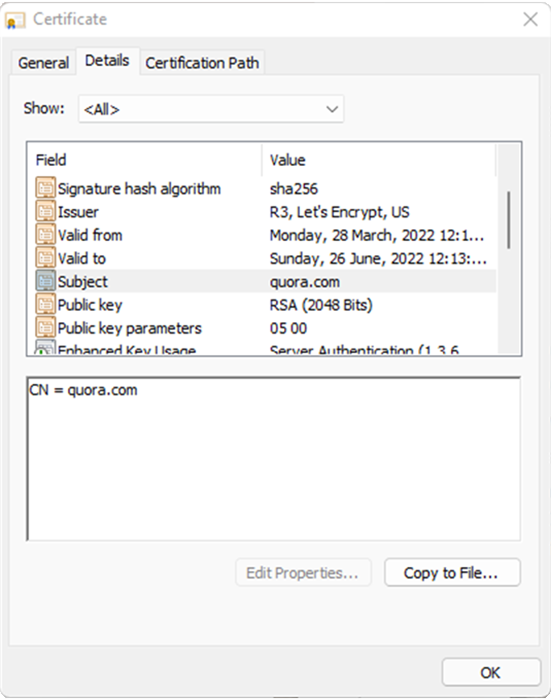
DV Certs showing the website domain name
There are choices for domain validation SSL certificates, such as “multi-domain certificate” and “Wildcard SSL certificate.” Wildcard SSL certificate permits users to secure multiple sub-domains, whereas a Multi-domain SSL certificate enables them to protect up to 100 distinct, fully qualified domain names.
Why Purchase Domain Validation Certificate?
Affordable Cost
The cost of domain validated (DV) certificates are lower than those of extended validated (EV) and organization validated (OV) certificates.
Google Ranking Benefits
Recently, Google announced that it would give SEO benefits to SSL-enabled websites. As a result of this, a DV SSL can help boost the website’s traffic and, consequently, the company’s revenue.
No paperwork for validation
A Certificate Authority does not require any paperwork during the domain name verification procedure.
Issued instantly
Once the domain verification procedure is completed, the Certificate Authority provides DV SSL certificates in minutes.
Increases user trust
Features such as HTTPS and a seal of approval assure users that the site is secure.
Key Features of a Domain Validated SSL Certificate
- Up to 256-bit encryption strength
- A 2048-bit SSL Certificate’s signature
- Both non-www and www domains are protected.
- Compatible with 99.9 % of the mobile and World Wide Web browsers.
- The official seal of a free certificate authority (CA)
- Instant issuance
- There is no need for documentation to validate it.
- The service offers a free phishing detection warning (Only available from a few certificate authorities).
- Until the expiration date arrives, the certificate may be reissued as often as required
- Other alternatives include Multi-Domain and Wildcard capabilities.
2. Organization Validation Certificates (OV)
A company/business/organization’s SSL certificate is a high assurance employed to assess a firm’s viability. The primary goal of an OV SSL certificate is to encrypt business/website and user data during transactions.
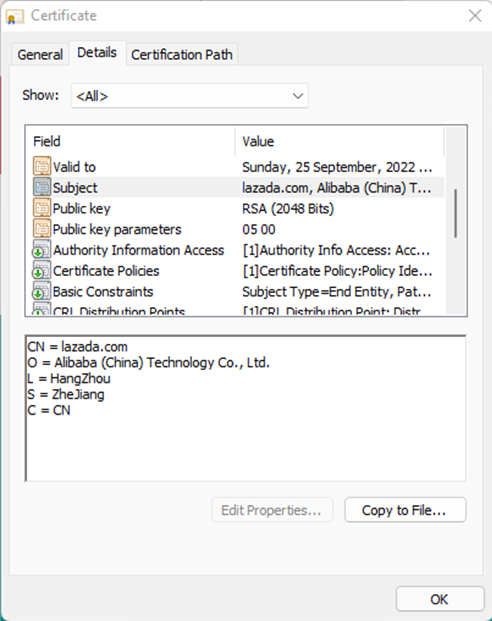
OV Certs showing website information
How DV SSL Certificates Work
The SSL Certificate Site Seal is an online presence that adds credibility and security to the website. It provides users with a 2048-bit signature as well as strong 256-bit encryption. In addition, the organization’s name is printed on the site seal; it serves as trusted proof verifying the company’s legitimacy and assures that the shared data is secure.
Websites using OV SSL certificates improve the security of your business by deterring phishing and keeping hackers at bay. Organization validated (OV) SSL is more trustworthy than Domain Validated (DV) SSL for internet companies, according to the PCI Security Standards Council.
OV SSL Certificate Validation Process
To obtain a business validation SSL certificate from a certificate authority, such as Comodo, Verisign, or DigiCert, the user/organization must submit business papers to the CA. The documents requested by the CA are determined by it. If the CA is satisfied with the paperwork submitted, it will approve them and offer a certificate.
The CA validates the documents before verifying the organization’s domain ownership. Mostly, the CA may validate a domain by email verification, file-based confirmation, or even checking directly with the domain registrar to confirm that it is genuine.
Before issuing a certificate, the CA may request the following documents.
- CA approved attestation letter
- Incorporation article
- Legal existence record
- An organization’s letter of relationship with the issuer
- Legal government license
- Bank statement
- Third-party database list
Depending on the specific CA requirements, the procedure might take anywhere from 2 to 3 days.
Who Should Buy OV SSL Certificate?
You should acquire an OV certificate if you have an online business that collects sensitive data from your customers. In addition, for security reasons, we strongly recommend adopting OV SSL certificates for social networking sites, Facebook games and apps, banking platforms, Google Chrome extensions, and Firefox add-ons.
The most frequent SSL Certificate that you’ll encounter is the Organization level Self-Signed OV SSL Certificates. These certificates have the option to include wildcard properties and a Multi-domain and Sub-domain validation capability. The multi-domain functionality permits users to protect 100 fully qualified domain names.
OV SSL Certificates are available from several certificate authorities (CAs) in the form of unlimited server licenses, allowing you to install them on many servers and reissue them as many times as needed.
Organization Validated SSL Key Features
- Your organization’s identification number is included
- Future-proof 2048-bit SSL Certificates
- A single SSL certificate protects both domain.com and www.domain.com, making it the ideal solution for companies with multiple domains or those who want to use a subdomain of their main domain
- Works with most mobile phones, web browsers, and devices
- SHA-2 signed certificates with 256-bit strong encryption
- Unlimited Reissuance and Server License
3. Extended Validation Certificates (EV)
Extended Validation SSL Certificates are the most secure and trusted way to communicate online. They provide excellent protection against identity theft, interception, and replay attacks while improving customer confidence. Also, EV offers an advanced level of security via an EV SSL certificate against email fraud, phishing scams, and other cyber-attacks.
The meta description is a section of text at the bottom of a website’s page that describes the content and provides users with more information about what they’re looking for. For example, it shows the company name in the URL, which indicates that it’s verified and genuine by a reputable SSL certificate authority (CA). This confidence eventually boosts your company’s success.
A digital certificate with security features is easier and faster to obtain, but it’s also more expensive. An EV SSL Certificate includes a multi-domain security option, allowing users to secure many domains (up to 100) under a single EV Certificate. This certificate is known as an “EV Multi-Domain SSL Certificate.”
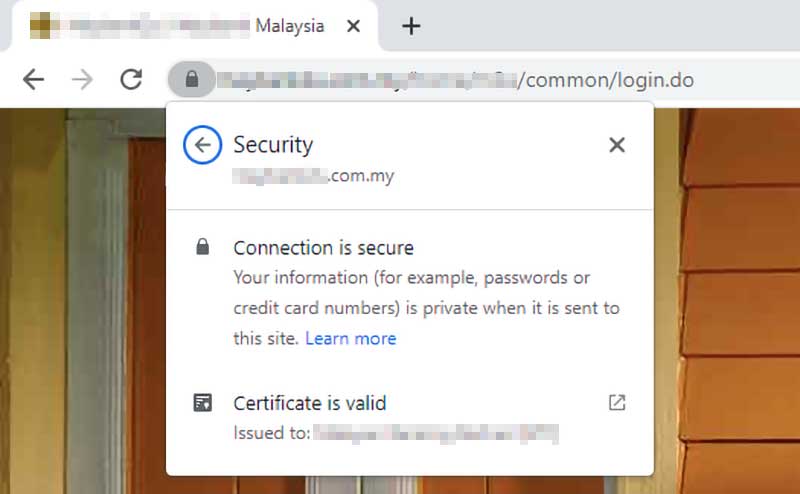
EV Certs can be immediately identified. The organization name is displayed when you click on “Connection is Secure.”
The Process of Validating the EV Security Certificate
The evaluation of the EV certificates is more rigorous and takes longer than that of DV and OV certificates. First, CA typically validates the company domain by comparing the details from the domain registrar. After that, the buyer will be required to submit business papers. Thet, CA approves and immediately issues the certificate request if the documents are verified according to the EV validation guideline. The requirements of a policy for document demands may differ among CAs.
How Do Extended Validation SSL Certificates Work?
An EV SSL Certificate, once installed on a website, shows the following trust elements: the company’s name in the certificate’s information panel and the padlock symbol.
The unique features that an EV SSL Certificate possesses are intended to deter phishing attacks by guaranteeing the website’s safety. Visitors trust websites that a reputable CA has authenticated because they see that they have been verified. These SSL Certificates are referred to as the most reputable certificates available on the market.
Types Of Extended Validation SSL Certificates
The EV SSL Certificates come in three forms:
- One Domain — offers security to only one domain; ideal for online shops and small websites;
- Multi Domain — protects multiple domains as well as subdomains. It is essential for big websites.
- Code Signing — offers protection to digital products, such as device drivers and software.
Unfortunately, there are no Wildcard EV SSL Certificates, and there is no method to combine them. If you want to encrypt your sub-domains using EV, consider purchasing a Multi-Domain EV SSL Certificate.
Who Should Use EV SSL Certificate?
The business that handles user payment information, confidential data, etc., should apply for an EV SSL certificate. The web security consultants advocate using EV SSL Certificates on platforms such as Banking, E-commerce, and social media because they are more secure. EV SSL certificates may now be purchased by any size business, regardless of industry or revenue. Small and medium-sized enterprises can obtain these (assuming they have all the files required by CA regulations).
Indicators That a Website Has EV SSL Certificate Enabled? – (EV SSL User Interface)
All major browsers, like Google Chrome, Internet Explorer, Mozilla Firefox, Opera, Safari, and others, support EV SSL certificates. These web browsers use the EV Identifiers provided by the certificate authority to identify EV SSL certificates (CA). Once a browser recognizes an EV SSL certificate, it will display indicators that it is correctly installed on the website.
An example of an EV SSL certificate interface is shown below:
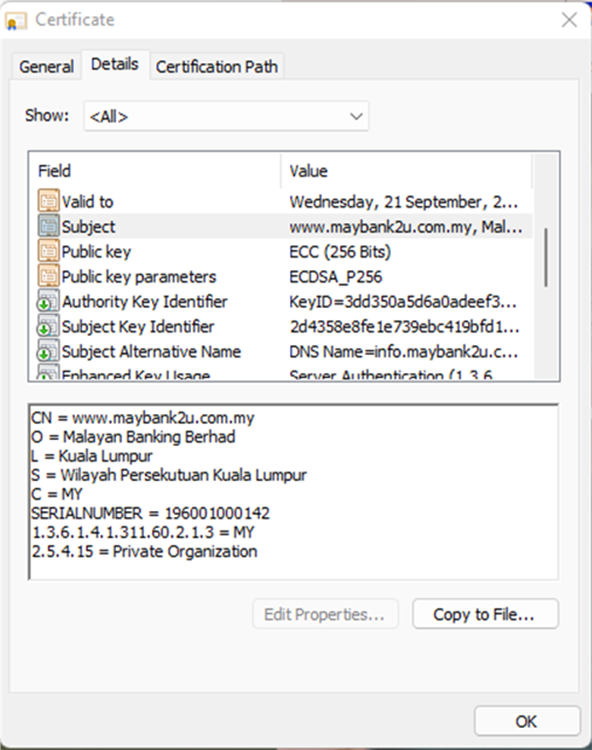
EV Certs showing more information listing about the website
The Address Bar in each browser displays an Organization Name which indicates that the company is genuine and validated by a reputable certificate authority. As a result, customers will not be concerned about disclosing their personal information or money. This shows that your business is authentic and encourages the client to conduct business and make transactions without hesitation.
Differences Between DV, OV, and EV SSL Certificates
The main difference between DV, OV, and EV SSL Certificates lies in the vetting process that each one goes through to be issued. A DV certificate is the easiest and quickest to obtain as it only requires that the applicant show that they control the domain name. An OV Certificate requires the applicant to undergo a more rigorous vetting process to verify their organization’s identity and business license. An EV Certificate requires an even more thorough vetting process consisting of a physical site inspection and the other requirements of the OV Certificate. As a result, EV Certificates provide users the highest level of assurance that they are dealing with a legitimate and trustworthy website.
Summary
SSL certificates are used by almost every website to ensure a safe internet connection. It’s no surprise, then, that it is strictly adhered to by major search engines in today’s cyber security climate. You now have a firm grasp on the many sorts of SSL certificates and their varying degrees of validation. We hope that this information will assist you in choosing the best SSL certificate for your website. As soon as you’ve completed installing an SSL certificate on your website, please perform an SSL check to ensure everything is up and running.



